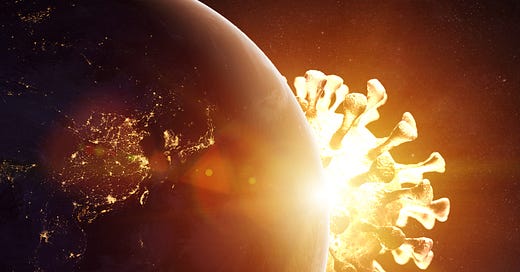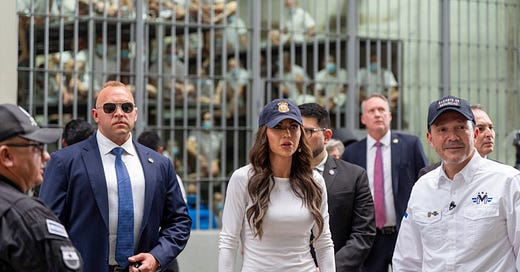
On Christmas Day 1989, to celebrate the fall of the Berlin wall, Leonard Bernstein led a performance of Beethoven's Ninth in East Berlin—or, one should say, in what had recently become the eastern part of a unified Berlin.
Bernstein made one change in the lyrics of Schiller's Ode to Joy, which the soloists and chorus sing in the Ninth's final movement. He substituted for the word "Freude" (Joy) the word "Freiheit" (Freedom). But joy was very much in the air as well. The joyful celebration of freedom that Christmas Day in Berlin seemed to epitomize humanity's hopes for the future.
On Christmas Day, 2019, Dr. Lu Xiaohong, the head of gastroenterology at City Hospital No. 5 in Wuhan, told China Youth Daily that a mysterious new disease, one that Chinese authorities refused to acknowledge, was spreading among medical staff at the hospital. The disease soon spread worldwide.
The death and devastation it has wrought seem to epitomize our fears for the future.
The spread of the novel coronavirus signals, one suspects, a time of novel challenges. And it may well mark the passing of an era.
The era was a fairly brief one as historical eras go—a mere three decades. It lacks its own distinctive name. It's merely the “post-Cold War” era. It was deprecated even as we lived through it—this period had a bum rap from the beginning—but it was not, truth to tell, a bad stretch for most of mankind.
It was marked here in America by at least two notable disasters.
There was September 11, 2001, which saw the most casualties ever suffered from a foreign attack on American soil. But for all the bumbling of the American response, the threat of Islamic extremism did not prove to be unmanageable. September 11 will not, as some feared, go down in history as the beginning of a world war, or a new kind of cold war, or even a clash of civilizations.
And then there was the financial crisis of 2008 which, for all the damage it did, proved not to be the beginning of another Great Depression.
At the end of 2019 it was reasonable to argue that the preceding three decades had been—for all the problems and discontents and upheavals—a time of unprecedented peace, prosperity, and—even with some backsliding in the last several years—freedom.
But it seems like, it feels like, that era is now over.
It's not just that the current crisis has now caused more deaths than 9/11—in fact it will almost certainly end up with more American deaths than we suffered on 9/11 combined with the long wars in Iraq and Afghanistan that followed. It's not just that 2020 is likely to feature a deeper recession than that of 2008. We still—one hopes—won't suffer the equivalent of the Great Depression and the world wars that preceded or followed it. It will still be possible, and correct, to say that in many, many ways America—and humanity—have never had it so good.
But one senses somehow that this pandemic is an inflection point. That historians of the future will write that the truncated 20th century (1914 to 1989) was followed by a three decade interregnum, which in turn was followed by . . . what?
Who knows? It’s entirely possible the rest of the 21st century will be a story of dictatorship, war, impoverishment, and inhumanity. Or it could be the opposite. Or something in between. But surely it will be different in character from the era we are departing.
In retrospect there were already signs of the end of the old era.
For example there was the 2016 election. That moment of peace and prosperity summoned forth the campaigns of Donald Trump and Bernie Sanders—two figures who promised not to continue the old order, but who portrayed the old order as fundamentally corrupt and broken. And who then promised to burn it to the ground. These two candidates won the support of almost half the primary electorates in each of America’s two major parties.
This was not a sign of the stability of the status quo or the vitality of the moment.
And the susceptibility of the public to false promises, the attraction to intellectuals of discredited doctrines—all of these, too, are indications that an era is ending and something new is struggling to be born.
My strong sense is that this something new will be new: Our ideologies won’t be the old “ism’s” (maybe we will be less possessed by “ism’s” in the first place). Our political parties won’t be the old parties (maybe we’ll have more than two of them). Our social issues, our economic debates, our foreign policy challenges will have only limited resemblance to what we’ve become accustomed.
But meanwhile here we are in 2020, stuck with a pitiful president, living in a dysfunctional political system, with illiberalism rising at home and in the driver's seat abroad, and facing technological and economic challenges different from those we've seen in the past. It's less dramatic than the 1860s. But still it is surely true that:
The dogmas of the quiet past are inadequate to the stormy present. The occasion is piled high with difficulty and we must rise with the occasion. As our case is new, we must think anew and act anew. We must disenthrall ourselves, and then we shall save our country.
Of course Lincoln thought anew and acted anew--but in service to old principles, to old conceptions and timeless principles. He and succeeding generations found new means to act, new arrangements and institutions based on and in support of the timeless “definitions and axioms of a free society.
Is the 21st century capable of such a new birth of freedom? Of course even to ask the question in this way is an evasion.
The real question isn't about the 21st century. It's about us.
Can we rise to the occasion, too?











